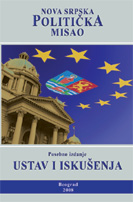| NSPM in English | |||
NATO's New Strategy: A Warning for the Balkans |
 |
 |
 |
| субота, 27. новембар 2010. | |
.jpg) NATO’s much heralded “New Strategic Concept,” adopted at the summit in Lisbon on November 20, provides a few additional reasons why those Balkan countries that are still outside the Alliance should stay out of it. NATO’s much heralded “New Strategic Concept,” adopted at the summit in Lisbon on November 20, provides a few additional reasons why those Balkan countries that are still outside the Alliance should stay out of it.
NATO and the uses to which Washington puts it constitute a messy tangle of contradictions. Outwardly, it appears to be what it always was: a defensive organization dedicated to collective security. Inwardly it is something else entirely. NATO’s mission was to contain the USSR—universally perceived as a threat—through collective security: an attack against one would be an attack against all. Although NATO had a war fighting doctrine, it sought mainly to deter attack. In this it succeeded splendidly; but since the demise of the USSR and the Warsaw Pact, NATO has morphed from a defensive alliance to fend off a commonly acknowledged threat into a vehicle for the attainment of U.S. global hegemony. The “Strategic Concept” does nothing to resolve this fundamental contradiction. The document’s “Core Tasks and Principles” do not offer a coherent strategic vision but rely on propagandistic rhetoric: “The Alliance remains an essential source of stability in an unpredictable world;” its member states “form a unique community of values, committed to the principles of individual liberty, democracy, human rights and the rule of law.” The authors assert with breathtaking audacity, in view of the aggression against Serbia 11 years ago, that “the Alliance is firmly committed to the purposes and principles of the Charter of the United Nations, and to the Washington Treaty, which affirms the primary responsibility of the Security Council for the maintenance of international peace and security.” The Concept illustrates the extent to which NATO has lost any sense of strategic purpose. Terrorism is singled out as “a direct threat,” as well as “trans-national illegal activities such as trafficking in arms, narcotics and people,” piracy, and cyber attacks by “foreign militaries and intelligence services, organised criminals, terrorist and/or extremist groups.” (The notion that NATO should combat human trafficking etc. is ridiculous not only in itself, but also because NATO protectorate Kosovo is one of the world’s great centers of human trafficking.) The Alliance brief now includes “assessing the impact of emerging security technologies,” as well as a host of environmental issues: “health risks, climate change, water scarcity and increasing energy needs will further shape the future security environment in areas of concern to NATO and have the potential to affect significantly NATO planning and operations.” Disruption of energy supplies is listed in the same league. A truly extraordinary novelty is that each of those “risks” is from now on a potential cause of war! The “Concept” commits NATO to “further develop doctrine and military capabilities for expeditionary operations,” which hints at the possibility of new out-of-area deployments. The fact that Concept was initially drafted by a group of experts chaired by former Secretary of State Madeleine Albright is an alarming indicator of the hidden agenda. At a time of extreme political, economic, military and moral weakness, Serbia in particular would be ill advised to join an organization committed to new “expeditionary operations,” but the same applies to Bosnia-Herzegovina and Montenegro. Serbia needs to pursue its key national interest—that of maintaining friendly relations with Russia. This cannot and will not happen if Serbia resorts to provocative acts such as joining a NATO bent on Russia’s encirclement. In defining its security arrangement Belgrade should adopt certain criteria based on the conventional understanding of Serbia’s national interest. They should include: Attention to cost. The cost of force modernization required to meet NATO standards would overburden and overwhelm the already weak Serbian economy; Refusal to commit Serbian forces and use them as American cannon-fodder in “expeditionary” missions not directly connected to the country’s national interests; Resistance to being pulled into geo-strategic alignments that are not in the national interest, that are overwhelmingly rejected by Serbia’s popular opinion, and would only exacerbate regional tensions. Serbia should seek its place within a European security architecture that embraces (and balances) the diverse security arrangements maintained by European states. They include NATO members, from Portugal to Estonia and Iceland to Greece; West European states that are not in NATO, such as Austria, Finland, Ireland, Sweden, and Switzerland; ex-Communist countries with scant interest in or prospect of joining NATO (Ukraine, Belarus, Georgia); and Russia, which occupies a category of its own. Whether viewing U.S. foreign policy through the prism of geo-strategy or ideology, Russia remains in NATO’s crosshairs. It has become an important means of changing the world in America’s image. If Serbia were to join, Belgrade would be enlisting in a crusade to encircle Moscow for the benefit of those who bombed Belgrade for 78 days eleven years ago. Such policy would be not only geopolitically self-defeating, but also morally criminal. What is NATO For? – The Strategic Concept concedes that “the Euro-Atlantic area is at peace and the threat of a conventional attack against NATO territory is low.” In other words, NATO’s Cold War area of hostility has all but disappeared, but its self-awarded areas of activity and authority are still proliferating. The Concept effectively codifies a shift from NATO’s defense of specific territories to its open-ended readiness to respond to redefined “threats” anywhere in the world. It is not contentious that terrorism, cyber attacks, arms, drugs and people trafficking, etc. are security threats which need to be addressed. The right tools for doing so are a conceptual approach freed from the shackles of Jihad-friendly political correctitude, an enhanced Interpol, an efficient intelligence network, and a dozen global SWAT teams. A military alliance of NATO’s structure and magnitude is absurdly ill-suited to the task, however. Including such threats in NATO’s brief – not to mention the environment, health, climate change, water, etc. – is nonsensical in grand-strategic terms. It means either that the Alliance is to become a global social worker on steroids, or else that it can be dragged into countless new interventions, theoretically justifiable by its new mandate. NATO and Russia – The key issue of grand strategy, NATO’s attitude to Russia, remains unresolved. The Concept asserts that “NATO poses no threat to Russia,” with which it seeks a true strategic partnership. We’ve heard similar statements before: in 1997 Bill Clinton and Boris Yeltsin signed the NATO-Russia Founding Act, which was soon followed – and rendered obsolete – by the Kosovo war in 1999 and the Alliance’s eastward expansion. Russia’s ambassador to NATO Dmitry Rogozin sarcastically articulated Moscow’s misgivings: “The NATO gamekeepers invite the Russian bear to go hunting rabbits together. The bear doesn’t understand: why do they have bear-hunting rifles?” NATO and Europe – An encouraging aspect of the European financial crisis – with Ireland as its latest episode – is that it makes further reduction of European military budgets inevitable. Since 2001, the Pentagon’s annual budget has increased by more than two-thirds in real terms from $400 billion to $700 billion, while inflation-adjusted defence spending across Europe fell by two per cent each year to just under $300 billion. Whatever new NATO “missions” are conjured in Washington, the lack of Europe’s political will to come on board will be coupled by the material inability to do so in a meaninful way. A necessary and successful European structure during the Cold War, NATO is obsolete and harmful today. It no longer provides collective security – an attack against one is an attack against all – of limited geographic scope (Europe) against a predatory totalitarian power. Instead, NATO has morphed into a vehicle for the attainment of misguided American strategic objectives on a global scale. The Lisbon Strategic Concept merely cements and perpetuates its new, U.S.-invented “mission” as a self-appointed promoter of democracy, protector of human rights, and guardian against instability outside its original area. It was on those grounds, rather than in response to any supposed threat, that the Clinton administration pushed for the admission of Poland, the Czech Republic, and Hungary in 1996, and President Bush brought in the Baltic republics, Bulgaria, and Rumania in 2004. Bill Clinton’s air war against the Serbs, which started in March 1999, marked a decisive shift in NATO’s mutation from a defensive alliance into a supranational security force based on the doctrine of “humanitarian intervention.” The trusty keeper of the gate of 1949 had morphed into a roaming vigilante five decades later. America and NATO – Since the collapse of the Soviet Union in 1991, Russia has been trying to articulate her goals and define her policies in terms of “traditional” national interests. By contrast, the early 1990’s witnessed the beginning of America’s futile attempt to assert her status as the only global “hyperpower.” The justification for their project was as ideological, and the implications were as revolutionary as anything concocted by Bolshevik revolutionaries Zinoviev or Trotsky in their heyday. When Mikhail Gorbachev’s agreement was needed for German reunification, President George H.W. Bush gave a firm and public promise that NATO wound not move eastward. Within years, however, Bill Clinton expanded NATO to include all the former Warsaw Pact countries of Central Europe. Instead of declaring victory and abolishing the alliance in the early 1990’s, the Clinton administration redesigned it as a mechanism for open-ended out-of-area interventions at a time when every rationale for its existence had disappeared. Following the air war against Serbia over a decade ago, NATO’s area of operations became unlimited, and its “mandate” entirely self-generated. Another round of NATO expansion came under George W. Bush, when three former Soviet Baltic republics were admitted. In 2007 Bush extended U.S. military assistance to aspiring NATO members, specifically Georgia and Ukraine. Further expansion, according to former National Security Advisor Zbigniew Brzezinski, was “historically mandatory, geopolitically desirable.” He openly admitted that NATO’s enlargement was not about U.S. security in any conventional sense, but “about America’s role in Europe – whether America will remain a European power and whether a larger democratic Europe will remain organically linked to America.” Such attitude is the source of endless problems for America and Europe alike. As the Lisbon Summit indicates, President Obama and his foreign policy team fail to grasp that a problem exists. There’s been a change of officials at the White House, but the Washington regime is still the same, and both NATO and America are still in need of a new strategy. That strategy should be based on the fact that the threat to Europe’s security does not come from Russia, or from a fresh bout of instability in the Balkans. The real threat to Europe’s security and to her survival comes from Islam, from the deluge of inassimilable Third World immigrants, and from collapsing birthrates. All three are due to the moral and cultural degeneracy, not to any shortage of soldiers and weaponry. The continued presence of a U.S. contingent of any size in Germany can do nothing to alleviate these problems, because they are cultural, moral and spiritual. Dangerous NATO Doctrine – NATO is detrimental to global security. It forces America to assume nominal responsibility for open-ended maintenance of a host of disputed East European frontiers that were drawn, often arbitrarily, by Communist dictators and by long-dead Versailles diplomats, and which bear little relation to ethnicity, geography, or history. With NATO still in place, eventual adjustments – which are inevitable – will be more potentially violent for the countries concerned and more risky for the U.S. The West does not have any interest in preserving an indefinite status quo in the region. Clinton’s 1999 war against Serbia was based on the his own doctrine of “humanitarian intervention,” which claimed the right of the United States to use military force to prevent or stop alleged human rights abuses as defined by Washington. This doctrine explicitly denied the validity of long-established norms – harking back to 1648 Westphalia – in favor of a supposedly higher “moral” objective. It paved the way for the pernicious Bush Doctrine of preventive war and “regime change” codified in the 2002 National Security Strategy. The Clinton-Bush Doctrine represented the global extension of the Soviet model of relations with Moscow’s satellites applied in the occupation of Czechoslovakia in August 1968. More than three decades after Prague 1968 the USSR was gone and the Warsaw Pact dismantled, but the principles of the Brezhnev Doctrine are not defunct. They survive in the neoliberal guise at the headquarters of NATO in Brussels. But the key difference between Brezhnev and Clinton was in the limited scope of the Soviet leader’s self-awarded outreach. His doctrine applied only to the “socialist community,” as opposed to the unlimited, potentially world-wide scope of “defending the values that give NATO meaning.” The “socialist community” led by Moscow stopped on the Elbe, after all. It was replaced by the “International Community” led by Washington, which stops nowhere. Inevitable Failure of the Lisbon “Concept” – The latest codification of the NATO doctrine, as presented in Lisbon, is the ideological pillar and self-referential framework for the policy of permanent global interventionism. It precludes any meaningful debate about the correlation between ends and means of American power, at a time when – after a brief period of American mono-polar dominance (1991-2008) – the global distribution of power is characterized by asymmetric multipolarity. Any attempt by a single power to keep its military strength beyond challenge is inherently destabilizing. Neither Napoleon nor Hitler knew any “natural” limits, but their ambition was confined to Europe. With the NATO doctrine today, the novelty is that this ambition is extended literally to the whole world. The globe itself is now effectively claimed as America’s sphere of influence, and NATO is the enforcement mechanism of choice. That neurotic dynamism is bound to be resisted ever more effectively and decisively by the emerging coalition of weaker powers (Russia, China, India, Brazil), acting on behalf of the essentially “conservative” principles of state sovereignty, national interest, and reaffirmation of the right to their own spheres of geopolitical dominance. The sooner they get their act together, the better for all, NATO powers included. http://www.balkanstudies.org/blog/natos-new-strategy-warning-balkans |
Остали чланци у рубрици
- Playing With Fire in Ukraine
- Kosovo as a res extra commercium and the alchemy of colonization
- The Balkans XX years after NATO aggression: the case of the Republic of Srpska – past, present and future
- Из архиве - Remarks Before the Foreign Affairs Committee of the European Parliament
- Dysfunction in the Balkans - Can the Post-Yugoslav Settlement Survive?
- Serbia’s latest would-be savior is a modernizer, a strongman - or both
- Why the Ukraine Crisis Is the West’s Fault
- The Ghosts of World War I Circle over Ukraine
- Nato's action plan in Ukraine is right out of Dr Strangelove
- Why Yanukovych Said No to Europe

.jpg)





















